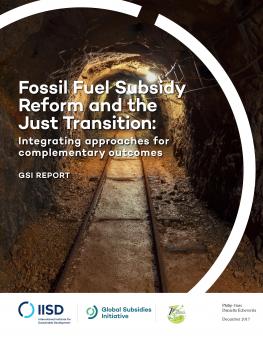
Fossil Fuel Subsidy Reform and the Just Transition: Integrating approaches for complementary outcomes
This paper goes into detail about the various ways in which FFSR can be consistent with just transition. The scale of current fossil fuel subsidies in the world coupled with the massive financial needs for transition are early indicators of the benefits of approaching FFSR with just transition in mind.
This report articulates how fossil fuel subsidy reform (FFSR) can contribute to a just transition, and how a just transition framework can contribute to successful reform.
The report explores a number of reasons for a framework, including alignment of the objectives of FFSR and just transition and, very importantly, FFSR’s ability to unlock revenues for implementing just transition.
Fossil fuel subsidies act against sustainability, while reform is consistent with just transition principles. These subsidies exacerbate greenhouse gas emissions, which contribute to climate change: removing global subsidies to fossil fuel production would save 37 Gt of carbon dioxide emissions by 2050. The elimination of all subsidies to fossil fuel production and consumption globally will reduce emissions by roughly 10 per cent.
This report goes into detail about the various ways in which FFSR can be consistent with just transition. The scale of current fossil fuel subsidies in the world coupled with the massive financial needs for transition are early indicators of the benefits of approaching FFSR with just transition in mind. Leveraging this misspent finance to support just transition is just one of many ways in which these issues can coalesce.
Participating experts
Additional downloads
You might also be interested in
The Cost of Fossil Fuel Reliance
Government support for fossil fuels reached at least USD 1.5 trillion in 2023, new data shows.
Increased Support Needed to Achieve India's Clean Energy Goals
India is on track to achieve many of its 2030 clean energy goals but needs to step up government support measures to accelerate the deployment of offshore wind, electric vehicles, and green hydrogen, according to a new report.
Artisanal and Small-Scale Mining of Critical Minerals
This report examines the potential for artisanal and small-scale mining (ASM) to take an expanded role in the global supply of critical minerals.
Ending Export Credits for Oil and Gas: How OECD countries can end 2024 with a climate win
For a year now, Organisation of Petroleum Exporting Countries (OECD) governments have been negotiating an agreement that could put an end to oil and gas export finance. Following the acrimony in Baku, this would be a very real way for the OECD to show policy coherence, respond to calls from the poorest countries to stop subsidizing fossil fuels, and shift public finance to solutions.